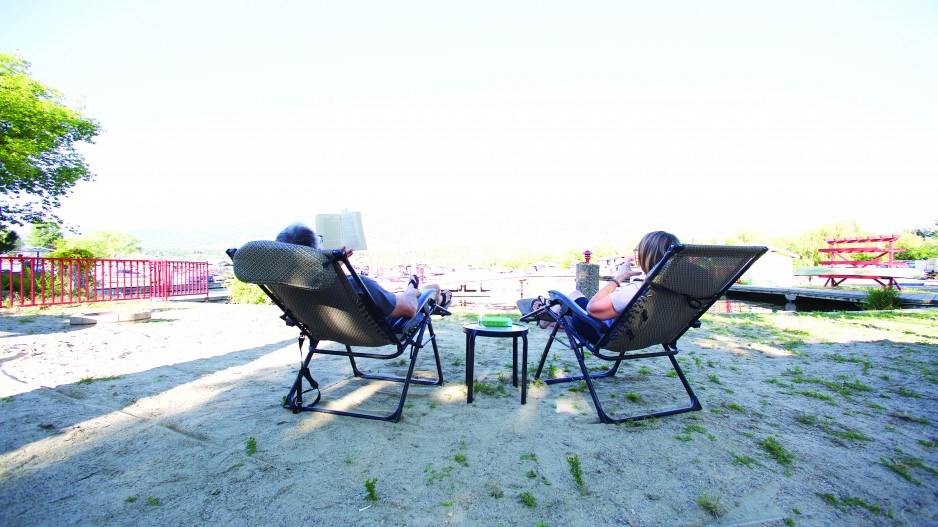So you have decided to heed Beautiful British Columbia’s marketing call of the wild and take the kids camping at Cultus Lake near Chilliwack or Rathtrevor Park on Vancouver Island.
Good luck with that.
You might discover that all the reservable spots were booked the minute they became available online at Discover Camping.
There are 10,700 provincial campsites in B.C., 5,800 of which can be reserved, leaving the balance available on a first-come, first-served basis.
But the reservable sites are typically snapped up within the first few minutes of them becoming available for booking online. The problem has become so bad that B.C. campsites are sometimes offered by scalpers on Craigslist for outrageous prices.
However, what many out-of-province campers might not know is that there are often plenty of campsites available in B.C., even in the middle of summer – they’re just not always that well marketed.
These private, First Nation, regional and Forest Service campgrounds could ease pressure on provincial campgrounds, although there is general agreement that BC Parks has fallen so far behind that it needs some serious capital funding to build new campsites in some of the more popular provincial campgrounds.
“Obviously, the big part is we don’t have enough campsites in B.C. parks,” said Gwen Barlee, national policy director for the Wilderness Committee.
The campground shortage became pronounced this summer when media reports pointed to block-booking by commercial RV camping operators.
But B.C. Environment Minister Mary Polak said commercial operators account for only about 1% of reservations and insists that it’s technologically impossible for commercial tour operators to block-book campsites.
“The site won’t let you do it.”
Barlee said the problem appears to be largely supply and demand because BC Parks has had its budget essentially frozen since 2009.
BC Parks has built only 200 new campsites in the last five years – not nearly enough to satisfy public demand.
The pressure on provincial parks is being exacerbated by the closure of privately owned campgrounds. During the last housing boom, several private campgrounds were sold to developers. The most recent example was Westbay Beach Resort in Kelowna, which is now being developed.
“There’s less and less of them, especially in the Okanagan and Shuswap,” said Patrick Gramiak, general manager for Wood Lake RV Park and Marina and vice-president of campgrounds for BC Lodging and Campground Association.
“It’s a very, very difficult industry to make a go of it because most of the land is on beautiful prime location land that makes it attractive to developers.”
Polak said BC Parks wants to build more campsites, but points out that whenever there is a move to expand campgrounds in provincial parks, there can be pushback from the public.
Barlee said the Wilderness Committee has no problem with expanding campgrounds in provincial parks, as long as it’s done “thoughtfully.”
Polak said her government wants to study the problem more before committing any capital to campground expansion. She added that, even when it is obvious that a popular campground needs more campsites, it’s sometimes physically impossible to expand. Rathtrevor Beach Provincial Park on Vancouver Island is one example.
“We do not have anymore land there,” Polak said. “We can’t add at Rathtrevor.”
What some visitors may not know is that, when Rathtrevor is full, there still might be campsites available just up the road near Qualicum Beach.
The Qualicum First Nation owns a campground that has 32 fully serviced waterfront campsites, and many more tenting sites.
“We’re not fully booked,” said Michael Hunt, manager of Qualicum First Nation Campground and RV Park. “We have a huge amount of unserviced camping – tent camping, dry camping for RV, buses, you name it. We have tons of sites available.”
In addition to First Nations campgrounds, there are regional campgrounds, like Descanso Bay on Gabriola Island and Horne Lake – both run by the Regional District of Nanaimo (RDN).
Tourists may have a hard time finding these campgrounds, however, because many people searching “campgrounds” in B.C. will eventually land on the Discover Camping website.
“All things lead there,” said RDN parks and trails co-ordinator Joan Michel. “The provincial product dominates.”
Michel said the RDN would use the Discover Camping website if the province were to make it available to regional campground operators.
Polak said the province is looking into making the booking service available to regional, First Nations and private campground operators as an overflow option when provincial parks are full.
But Troy Davis, manager for Cultus Lake Park campgrounds, said he sees a problem with that. (Cultus Lake Park is a quasi-municipal operation that runs two campgrounds; it’s not Cultus Lake Provincial Park.)
Davis said it would help ease the pressure on provincial campgrounds if other types of campgrounds could be promoted and booked through Discover Camping, but he doesn’t think many campground operators would want to pay the credit card and other fees that Camis, the company that runs the Discover Camping website, charges.
Another option for BC Parks might be to make better use of its Forest Service campgrounds. The sites offer few amenities – pit toilets are about as luxurious as they get. And the roads can be in rough shape.
Upgrading these sites would take capital spending, and BC Parks appears to be low on the B.C. government’s spending priority list.
“The government seems to have taken – for the last 10 years anyways – a hands-off approach to parks,” Barlee said. “And there’s a big backlog of infrastructure stuff that needs to be done.”




